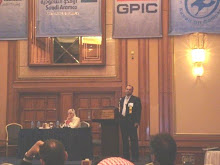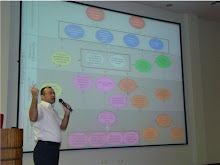Issues Management
Effectively use an Issues Management system to control the speedy resolution of issues. Ensure an issues escalation process is in place, and all stakeholders understand their responsibilities in identifying and resolving issues.
Supports with putting in place project and programme Issues Management systems across the organisation.
People Management
Effectively manages people working on the project. Set up and control a Resource Plan, ensuring all those involved understand and agree to their responsibilities. Monitor individuals’ performance, conducting performance appraisals and coaching where required.
Able to define project roles and relate them to personal KPIs, corporate roles and structures, often on multiple and very large projects.
Conduct People Management at the programme level.
Achievement and drive: Vision, Goal focused, Energy and drive, Risk taking
Work to establish a culture of high achievement amongst peers and project members. Ensure at all times that key stakeholders understand and accept the vision for the project. Promote the ‘can do – will do’ attitude to projects, gaining support and respect from those involved.
Lead others in developing these qualities for themselves.
Work closely with senior management to ensure the overall vision of the programme is clearly understood, and articulated, to all involved with the programme.
Systems thinking, Creativity, Decision making, Strategic Thinking
Can think clearly, creatively and logically in all aspects of managing the project. In creating buy-in to the project by ensuring good decision making process is made. Can think holistically, as well at a detail level. Balance the application of qualitative and quantitative methods thus removing ‘opinion-based decision making’ with ‘measurement-based decision making’.
Successful in running efficient meetings and refining and continually improving communication channels.
Awareness and influence: Organization and Business awareness, Cultural awareness, Anticipation of impact, Resourceful use of influence
Have a good understanding of how the organization works, who the influential people are and how politics operate. Anticipate situations and changes and take appropriate actions to minimize negative impacts on the project.
Use personal influence well, but also seeks the counsel of those with experience and wisdom.
Negotiation and conflict resolution
Recognize that efficient problem-solving is necessary for effective project execution. Adept at negotiating the right outcomes with project team members and stakeholders. Use good techniques in conflict resolution, working continually to ensure conflicts are resolved at the lowest level in the project.
About The Author

- Eng. Samer el Barakeh, MPM, PMP
- Samer el Barakeh was born in Lebanon, 1973. He completed his Bachelor in Engineering-CCE at Beirut Arab University-Lebanon in 1996 with honours. Samer was granted Masters Degree in Project Management (MPM) from the University of Sydney-Australia with honours. He also gained the Project Management Professional (PMP) Credential from The Project Management Institute (PMI). Samer is a member of the Order of Architects and Engineers in Lebanon since 1996, The Project Management Institute (PMI), Arabian Gulf Chapter (AGC-PMI) and Lebanon Chapter-PMI. During his 13 years of professional experience in Lebanon, Australia and Saudi Arabia, Samer held many positions among them: Telecommunication Site Engineer, Site Manager, Low Current Service Head, and he is currently Senior Systems Analyst at the General Project Construction Division. Samer is a Project Management Consultant and Training Provider for universal organizations like Business Management Consultants (USA) www.bmc-online.com and PMCTQuest (Canada) www.pmctquest.com Samer is a Registered Training Provider for Project Management Professional (PMP), and he provides training in Program Management, Portfolio Management,PMO...
Select a topic to view content
- A comparison between PMBOK and Prince2 Methodologies and reflection on case study examples (1)
- ABC to Avoid Project Failure (1)
- Business Case and Quantitative Benefits (1)
- Do we need more 'Planners' ? (1)
- Fasilitator in Partnering-A Coincise Shot (1)
- How to Ensure Stratgic Alignment of Our Projects? (1)
- Individual Dissimilarity and Team Work (1)
- Knowledge Management (1)
- Maturity Models-The Pros and Cons (1)
- Organizational Advantages from Partnering (1)
- Organizational Maturity: Lets Head Upwards... (1)
- Organizational Strategy and Project Alignement (1)
- Practical Solutions 1 of 6: Introduce RMMM (1)
- Practical Solutions 2 of 6: Facilitate Change to Perk up Maturity (1)
- Practical Solutions 3 of 6: Leverage Organisational Culture Barrier (1)
- Practical Solutions 4 of 6: Organisational Cultural Alignment (1)
- Practical Solutions 5 of 6: Defining a Unified Decision Making Tool (1)
- Practical Solutions 6 of 6: Understanding The Paradox of Control (1)
- Programme Management to Implement Strategy (1)
- Project Management and Construction Management (1)
- Project Managers relocated before Proper Project Closure and Learning Lessons (1)
- Project Managers' Power (1)
- Strategic Planning (1)
- Successful Project Management Office-PMO (1)
- System Thinking: Archetypes at Work... (1)
- The Partnering Change Process (1)
- The Upper Hand… Leadership skills or Processes? (1)
- Thinking about change needed? Maybe you should be more ‘worried’ about how to make it real (1)
- Vision Mission and Objectives What and Why? (1)
- What is meant by Portfolio and Programme Management (1)
- Why Partnering in Organizations? (1)
January 1, 2006
Leadership Skills
Posted by
Eng. Samer el Barakeh, MPM, PMP
at
11:16 PM
![]()
![]()
Followers
All Titles
A comparison between PMBOK and Prince2 Methodologies and reflection on case study examples
ABC to Avoid Project Failure
Business Case and Quantitative Benefits
Do we need more 'Planners' ?
Fasilitator in Partnering-A Coincise Shot
How to Ensure Stratgic Alignment of Our Projects?
Individual Dissimilarity and Team Work
Knowledge Management
Maturity Models-The Pros and Cons
Organizational Advantages from Partnering
Organizational Maturity: Lets Head Upwards...
Organizational Strategy and Project Alignement
Practical Solutions 1 of 6: Introduce RMMM
Practical Solutions 2 of 6: Facilitate Change to Perk up Maturity
Practical Solutions 3 of 6: Leverage Organisational Culture Barrier
Practical Solutions 4 of 6: Organisational Cultural Alignment
Practical Solutions 5 of 6: Defining a Unified Decision Making Tool
Practical Solutions 6 of 6: Understanding The Paradox of Control
Programme Management to Implement Strategy
Project Management and Construction Management
Project Managers relocated before Proper Project Closure and Learning Lessons
Project Managers' Power
Strategic Planning
Successful Project Management Office-PMO
System Thinking: Archetypes at Work...
The Partnering Change Process
The Upper Hand… Leadership skills or Processes?
Thinking about change needed? Maybe you should be more ‘worried’ about how to make it real
Vision Mission and Objectives What and Why?
What is meant by Portfolio and Programme Management
Why Partnering in Organizations?















